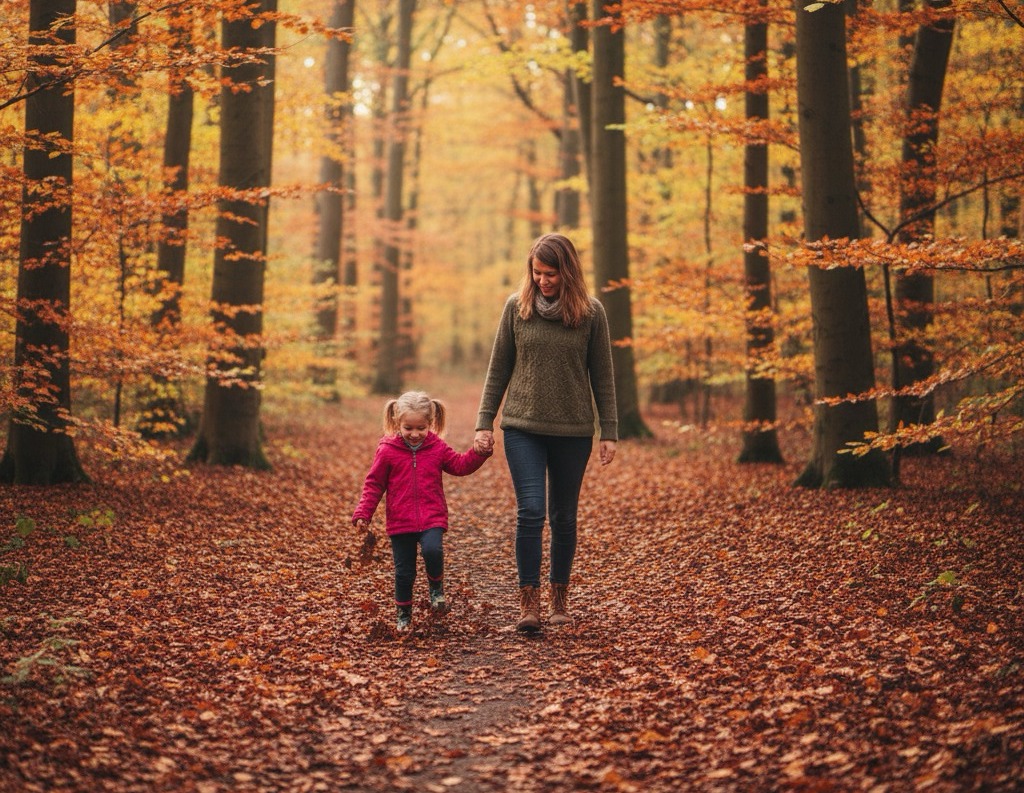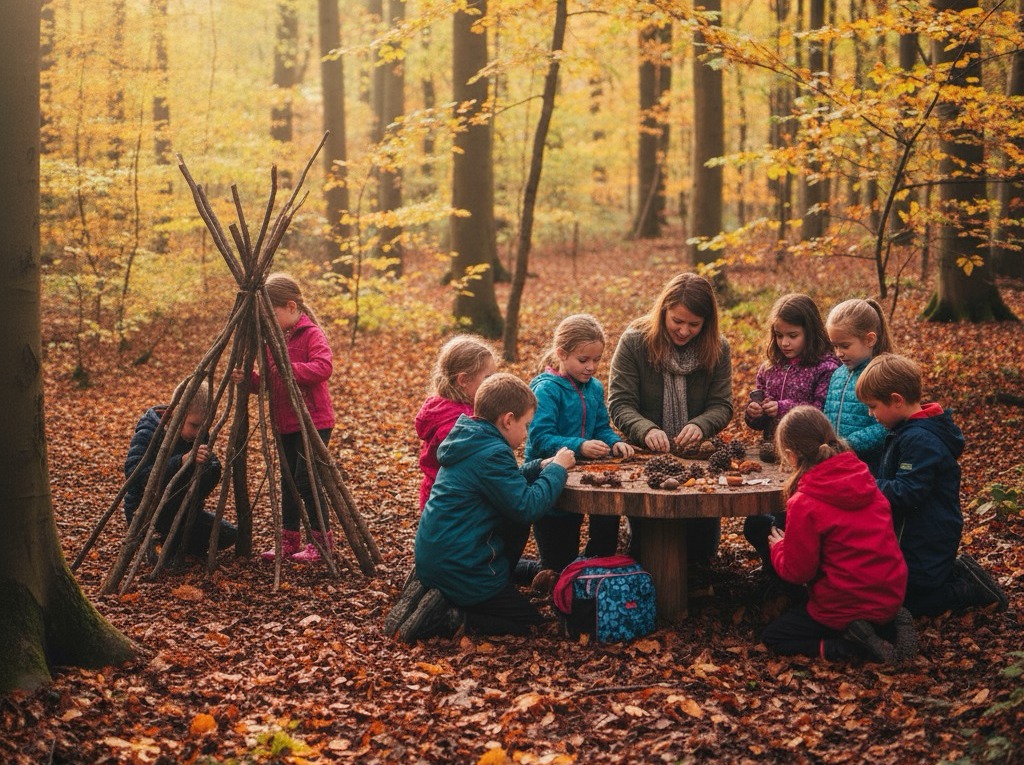· Guides & Resources · 8 min read
Forest School & Outdoor Learning: Your Complete Guide for Curious Parents
Everything parents need to know about Forest School and outdoor learning: what it is, its core principles, the profound benefits for children's development, and why it's more than just playing outside.

As a parent, you’re always looking for experiences that will help your child thrive. You hear about different educational approaches, and “Forest School” likely pops up more and more. It sounds wonderful – children outdoors, exploring, learning, and connecting with nature. But what does it really involve? How does it differ from a regular walk in the park, and what are the true, lasting benefits for your child’s development?
This guide aims to be your comprehensive introduction to Forest School and the broader world of outdoor learning. We’ll explore what it is, the philosophy behind it, and the very real advantages it offers. Understanding these aspects can help you see why so many parents and educators are embracing this approach and might lead you to explore local options for your own family – perhaps even through resources like a Forest School finder.
What is Forest School? Unpacking the Approach
So, what is Forest School when we look beyond a simple definition? It’s an inspirational, child-led educational philosophy that unfolds primarily within a natural, often woodland, setting. It’s not merely about being outside; it’s a distinct approach with a clear ethos. Forest School is best understood as a long-term process, involving regular and repeated sessions in the same natural space. This continuity allows children to forge a deep connection with their environment, keenly observe the rhythm of the seasons, and progressively build upon their skills and experiences.
A cornerstone of Forest School is its child-led nature. While qualified practitioners guide and support the sessions, the children’s own innate curiosity and interests significantly shape the learning journey. If a particular discovery captures their imagination – be it an unusual insect, the challenge of a fallen tree, or the desire to create a shelter – this becomes a natural springboard for exploration and learning. Play is the fundamental medium through which this learning occurs. Children at Forest School investigate, experiment, imagine, and solve problems through playful engagement. This isn’t aimless activity; it’s the primary way young minds make sense of their world, test theories, and cultivate essential cognitive and social competencies. The natural environment itself serves as a dynamic and stimulating classroom, offering endless opportunities for authentic discovery and challenge. Ultimately, Forest School is dedicated to holistic development, nurturing a child’s physical, social, emotional, intellectual, and communication abilities in a balanced and integrated manner. This structured, long-term, and facilitative approach distinguishes it from more casual outdoor play or one-off nature walks.
The Value of Outdoor Learning for Children’s Development
Forest School is a specialised form of a broader concept: outdoor learning. This term describes any educational experience that takes place beyond the confines of a traditional classroom. The scope is wide, from cultivating a school vegetable patch to undertaking geographical fieldwork, and, of course, participating in Forest School.
The power of outdoor learning for children’s development is immense and multifaceted. When children learn outdoors, they engage all their senses. They can feel the varied textures of bark and moss, inhale the scent of damp earth after rain, observe the myriad colours and intricate patterns in a leaf, and listen to the chorus of birdsong or the rustle of wind through the trees. This rich, multi-sensory immersion makes learning experiences more vivid, memorable, and deeply understood. Concepts that might appear abstract on a whiteboard, such as principles of physics or biological life cycles, become tangible and relatable when children are physically involved in building structures or observing a living ecosystem.
Furthermore, the outdoors naturally invites physical activity. The simple acts of running across a field, climbing a tree, balancing along a fallen log, or digging in the earth are fundamental for robust physical health. These activities develop gross motor skills, improve coordination, and build stamina. Beyond the physical, time spent in nature is consistently linked to enhanced mental wellbeing. It has a proven capacity to reduce stress, elevate mood, and sharpen concentration. The natural environment often provides a calming, restorative atmosphere that supports emotional regulation. The sheer space offered by the outdoors also permits a scale of exploration and movement that is rarely possible indoors, allowing for different types of learning and social interaction. Forest School thoughtfully harnesses these inherent benefits of outdoor learning, embedding them within its unique, nurturing, and developmental framework, making it a particularly impactful educational methodology.
The Guiding Ethos: Core Principles of Forest School
To fully appreciate Forest School, understanding its guiding principles is essential. These tenets ensure the integrity, quality, and consistency of genuine Forest School provision. The core Forest School Principles/Ethos include:
- A Long-Term Process: Forest School involves regular, frequent sessions in the same natural space over an extended period, fostering a deep connection with nature and allowing for progressive skill development.
- A Woodland or Natural Environment Setting: The learning takes place in a natural setting, ideally with trees, which provides a rich, stimulating environment for exploration and learning.
- A Learner-Centred Philosophy: It promotes holistic development (physical, social, emotional, cognitive, and spiritual) and is driven by the child’s interests, choices, and intrinsic motivations.
- Supported Risk-Taking: Children are encouraged to identify and take appropriate risks, learning to assess situations and make informed decisions in a supportive environment. This builds resilience, confidence, and problem-solving skills.
- Qualified and Reflective Practitioners: Sessions are led by qualified Forest School leaders who are trained in child development, woodland skills, risk management, and facilitating learning. They engage in ongoing reflection and professional development.
- Development of a Community of Learners: Forest School aims to create a supportive and collaborative learning community, typically with high adult-to-child ratios to ensure individual needs are met and strong relationships are built.
- Fostering Resilience, Confidence, Independence, and Creativity: Through hands-on experiences and achievable challenges, children develop these crucial life skills.
These principles, working in concert, ensure Forest School is a transformative and carefully considered educational experience.
Unpacking the Rewards: Why Choose Forest School for Your Child?
Understanding the “what” and the “how” of Forest School naturally leads to the question of “why?” Why choose Forest School amidst other options for your child? The benefits of Forest School for children’s development are compelling, offering a wealth of advantages that contribute significantly to their overall growth and wellbeing. Here are some key rewards:
Boosted Confidence and Self-Esteem: Children are trusted with genuine responsibilities, such as using tools under supervision or taking the lead in an activity. Successfully mastering new skills and overcoming challenges provides a powerful and authentic sense of accomplishment, building a strong belief in their own capabilities.
Enhanced Social Skills and Emotional Intelligence: Many Forest School activities are naturally collaborative, requiring children to communicate their ideas, listen to others, share resources, and work effectively as a team. They learn to navigate social situations, develop empathy, and manage their emotions with the support of leaders and peers.
Improved Physical Development: The dynamic outdoor environment encourages a wide range of physical activity. Gross motor skills are honed through running, jumping, climbing, balancing, and carrying. Fine motor skills and coordination develop through tasks like whittling, tying knots, and manipulating natural materials for crafts.
Sharpened Cognitive Skills and Problem-Solving Abilities: Children encounter real-life problems that require creative thinking and practical solutions – from designing a shelter that will stay dry to figuring out how to move a heavy object. Their observation skills are constantly engaged, and they gain a practical understanding of scientific and mathematical concepts in a meaningful context.
Developed Language and Communication: The rich sensory environment and unique experiences provide a natural stimulus for language development. Children expand their vocabulary, learn to articulate their thoughts and observations clearly, and develop their listening skills through group discussions and collaborative planning.
Increased Resilience and Adaptability: Experiencing and adapting to varying weather conditions, persevering with challenging tasks, and learning to manage minor setbacks in a supportive setting all contribute to building resilience. Children learn to be more adaptable and resourceful.
Deepened Connection to Nature and Environmental Awareness: Regular, positive engagement with the natural world fosters a profound sense of connection, respect, and understanding for the environment. Children learn about local flora and fauna, seasonal changes, and ecological principles first-hand, often leading to a lifelong appreciation for nature.
Better Mental Wellbeing: Time spent in nature is widely recognised for its positive impact on mental health. The calming and restorative atmosphere of a woodland setting can help reduce stress and anxiety, improve mood, and enhance children’s ability to focus and self-regulate.
Choosing Forest School means choosing an environment where your child can grow in multiple dimensions. It’s an investment in their overall wellbeing and development, equipping them with skills and attitudes that will serve them well in formal schooling and throughout life.
Forest School offers a unique journey of discovery, adventure, and learning. It’s an approach that recognises the profound capacity of children to learn through their own explorations and the incredible educational power of the natural world. By understanding its core philosophy and benefits, you can make an informed decision about whether this enriching experience is right for your child.


